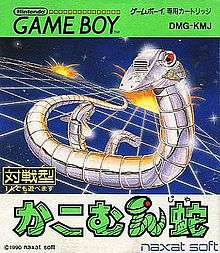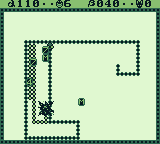Serpent (video game)
| Serpent | |
|---|---|
 Japanese cover art | |
| Developer(s) | Naxat Soft[1] |
| Publisher(s) |
Naxat Soft Taxan |
| Composer(s) | Atsuhiro Motoyama[2] |
| Platform(s) | Game Boy |
| Release date(s) | |
| Genre(s) | Action,[1] snake game |
| Mode(s) |
Single-player Multiplayer (up to two players) |
Serpent (かこむん蛇 Kakomunja) is a Game Boy snake game developed by Naxat Soft. It was released in 1990 for the North American and Japanese markets.
Gameplay

In the future, there is a sport called Serpent. Two fighters in serpentine robotic machines try to box each other in to win the fight. The serpents are detailed in the fact that they aren't just a line, giving a greater sense of realism to the game. Each snake has a fixed amount of lives; with losing a life being a representation of "losing the war." The "game over" message is a simple message saying "the bitter taste of defeat" with an animated picture of a snake crying and accompanied by a melancholic music in a waltz rhythm.
There are two modes with four difficulty levels; level 1 is considered to be the easiest (normal speed and enemy performance) while level 4 is the hardest (fast speed and enemies are likely to cheat death). The first mode allows players to simply compete against an opponent while the second mode brings in a series of small snakes that emerge when players take too long conquering a level.[3] Missiles can be launched when the player collects them on the field. White numbers help the player develop a longer body while black numbers make the body shorter.[4]
Missiles can either make the enemy faster (black missiles) or slower (white missiles). Winning 7 of the 13 possible matches automatically makes the player into the "champion of serpents.[3]"
References
- 1 2 3 4 "Release information for Serpent". GameFAQs. Retrieved 2012-07-04.
- ↑ "Composer information for Serpent". Portable Music History. Retrieved 2012-09-21.
- 1 2 "Basic overview of Serpent". allgame. Retrieved 2012-07-04.
- ↑ "Advanced overview of Serpent" (in Japanese). GB no Game Seiha Shimasho. Retrieved 2012-07-04.
External links
| Reception | ||||||
|---|---|---|---|---|---|---|
| ||||||